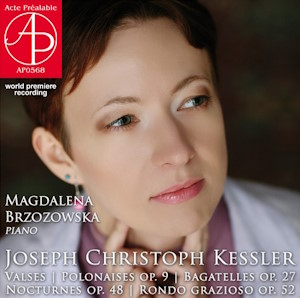
Joseph Christoph Kessler (1800-1872)
Trois Polonaises op.9
Six Bagatelles Op.27
Valse (Ländler)
Ludwika Valse
Mazure et Valse
Rondo Grazioso Op.52 (pub. 1857)
Deux Nocturnes Op.48
Magdalena Brzozowska (piano)
rec. 2023, Akademia Muzyczna w Łodzi, Poland
Acte Préalable AP0568 [68]
This is the third volume of piano works by Joseph Christoph Kessler that Magdalena Brzozowska has recorded for Polish label Acte Préalable. Previous volumes have been reviewed here (Volume 1 ~ Volume 2) and have mostly been praised. I can echo that with the caveat that I find the music interesting rather than memorable.
Kessler was born in Augsburg in 1800 and spent much of his life in Poland, teaching, composing and generally getting involved in the musical life of the cities he lived in, Warsaw, Cracow and Lvov. In 1855 he moved to Vienna where he died in 1872 and where he championed Polish music and musicians. The works on this CD presumably date from across his career though only one date is given, the publication date of his Rondo grazioso. The three polonaises op.9 which sound like early works are quite idiomatic and have a very classical idea of what a typical courtly polonaise should be, more in the world of Hummel and the early romantics than Chopin and his epic and noble polonaises. They are all in a standard form with the polonaise book-ending a contrasted trio. The Bagatelles create a stronger impression and reminded me mostly of Schubert particularly in the dotted rhythms of the fourth and lilt of the fifth, a little like modest cousins to the moments musicaux.
The two valses are elegant and slight; Ludwika does not venture beyond A flat in its brief span but the Valse (Ländler) is more interesting, hovering between Schubert and Chopin and bouncing harmonically between B major and D sharp major; like many pieces here it is an ABA form. I find it odd that Brzozowska chooses to end the piece part way through the repeat of the waltz. It is an okay place to stop but one would expect the entire waltz to repeat and, more especially to end in the home key rather than at the end of the D sharp major section; it is not marked in the score. The Mazure et Valse sits alongside these and is more waltz than mazurka; certainly don’t expect anything like Chopin’s mazurkas though it is pleasant enough.
Staying in Chopin territory we have the two nocturnes op.48, similar in vein but echoing the world of John Field more than Chopin. Both feature a long melody over a flowing left hand triplet accompaniment, the melody increasingly decorated as the pieces develop and having a more dramatic central section. I must say that the tremolando writing and sixteen bars of E flat minor became tedious quickly though it developed harmonically after that. The middle section of the second nocturne in D flat is more effective with a melody that is divided between the hands. Finally there is the rondo grazioso, an extended and at times quite virtuosic piece. If one is expecting something like Weber’s frothy piano rondos think again – this is a more melancholic piece that opens in A flat minor with a sadly plodding little melody. Harmonically Kessler does some interesting things; the major key repeat of the theme ends on a leading note trill that continues as the first theme returns rather unexpectedly in the new key of C minor though a cadenza soon returns us to the home key. Kessler’s explorations continue throughout the piece which contains some appropriately virtuoso sections and even more side-stepping harmony – I particularly enjoyed the passage where the theme re-appears for just two bars before pausing and trying again a semitone lower then…no that’s not it, let’s try again another semitone lower. For all the virtuosity and grand gestures that it at times exhibits the piece slowly winds down to a tranquil ending. It is undoubtedly the most interesting piece here and one gets hints of what the likes of Chopin and Liszt would have found to admire in him as a composer.
Notes are in Polish, English and French and I don’t find any of the ‘interesting’ spelling that was found in the notes to earlier volumes though what is there says little about the actually pieces. The recorded sound is a bit closely miked but not unpleasantly so and Ms Brzozowska plays with commitment; I would have preferred she relaxed a little more in her phrasing of the nocturnes but that is a minor quibble.
Rob Challinor
Help us financially by purchasing this through MWI



















